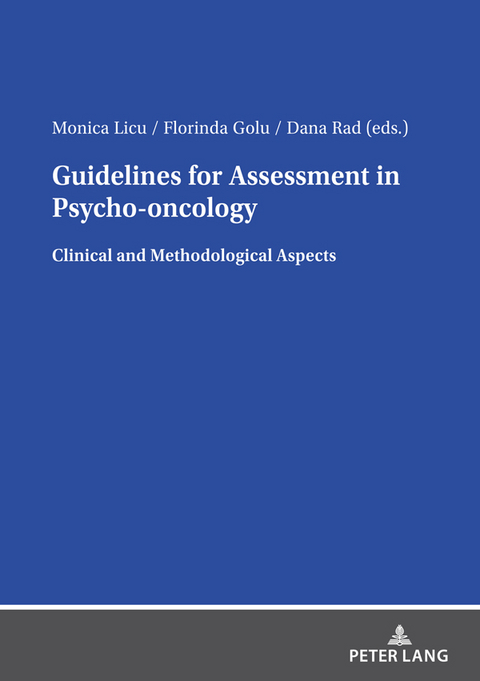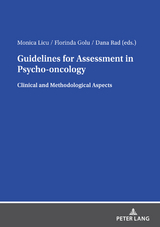Guidelines for Assessment in Psycho- oncology
Peter Lang Gmbh, Internationaler Verlag Der Wissenschaften
978-3-631-91111-2 (ISBN)
Evelina Balas, Ph.D., is an associate professor at the Faculty of Educational Sciences, Psychology and Social Sciences at Aurel Vlaicu University of Arad, Romania and Head of the Sociopsychopedagogical Research Center for Promoting Excellence in the Profession. Evelina is an educational and pedagogy specialist and a principal investigator in multiple European Union-funded projects on the topic of education for all ages. Alina Roman, Ph.D., is a professor habil. at Faculty of Educational Sciences, Psychology and Social Sciences at Aurel Vlaicu University of Arad, Romania and Dean of the Faculty of Educational Sciences, Psychology and Social Sciences. Her areas of interest include digital wellbeing, educational assessment, interactive strategies in the teaching and learning process and the efficiency of didactic activities outdoor. Dana Rad, Ph.D., is an associate professor at Aurel Vlaicu University of Arad, Romania and the head of the Center of Research, Development and Innovation in Psychology. Her areas of interest include digital wellbeing, organizational psychology, psychoinformatics and cognitive systems engineering.
List of contributors – Dana Rad/Gavril Rad/Edgar Demeter/Roxana Maier: Digital wellbeing or finding a balance between consciously connecting and disconnecting: A positive technology design approach – Otilia Todor/Tiberiu Dughi/Dana Dughi: Feuerstein’s instrumental enrichment in online interaction and wellbeing of children – Gabriela Vancu/Anca Egerău: Impact of family interactions and emotion-based training program on aggressive behavior of adolescents within special educational centers – Gabriela Vancu/Anca Egerău: Impact of online activity upon social phobia in young adults – Vlad Adrian Geantă/Viorel Petru Ardelean: Effects of circuit training at home: Improving wellbeing and quality of life in sedentary men during the covid-19 pandemic – Zsolt Bartha/András Kokai/Gábor Kincses: Sport digitalization, between recreation and the Olympic games – Dorin Herlo/Rebecca Pui: Common concerns of the professor and the student for increasing the digital wellbeing in the educational framework – Silvia Nicoleta Mirica/Cerasela Domokos/Martin Domokos/Cristian Negrea/Eugen Bota/Adrian Nagel: Is covid-19 pandemic period the milestone for a new digitalized era in the case of physical education and sport’s educational process? – Edgar Demeter/Dana Rad: Time spent on digital devices and sadness: The mediating outcome of boredom – Gabriela Kelemen: Early education: What can we do for improving quality – Camelia-Nadia Bran/Mădălina Sas: Promoting children’s wellbeing in primary school through the development of socio-emotional competences – Henrietta Torkos/Tabitha Bernadet Pasinszky: Digital wellbeing during online education in preschool in the context of pandemics – Cornelia Evelina Balaș/Maria-Alexandra Martin: The role of emotional intelligence in the development of the wellbeing for teachers: A theoretical perspective – Alina-Maria Breaz: Attitude of people with disability towards satisfaction in work: Practical insight – Bogdan Hrițcu/Cristian Negrea/Cerasela Domokos/Martin Domokos/Eugen Bota/Silvia Nicoleta Mirica/Adrian Nagel: The inequality of benefits brought by training programs with different number of weekly sessions – Cristian Negrea/Silvia Nicoleta Mirică/Cerasela Domokos/Martin Domokos/Eugen Bota/Adrian Nagel: Influences on life quality of adults with the help of digital technologies: A journey from a sedentary life to jogging – Diana Mariana (Boeriu) Sfăt/Nicoleta Florica Petruse: Digital resources: A big challenge at preschool level – Remus Runcan: The reasons we need crisis intervention in time of covid-19 pandemic – Viorel Petru Ardelean/Vlad Adrian Geantă/Andreea Nicoară: Proposals for improving the wellbeing of people in the technology era: Case study on the efficiency of whole body EMS training – Dr. Sonal Mobar Roy: Deconstructing the notion of "digital wellbeing" through a postmodern lens – Alina Costin/Alina Roman: Homo connecticus and the reconstruct of the self-image through social networks
| Erscheinungsdatum | 23.04.2024 |
|---|---|
| Verlagsort | Frankfurt a.M. |
| Sprache | englisch |
| Maße | 148 x 210 mm |
| Gewicht | 220 g |
| Themenwelt | Geisteswissenschaften ► Psychologie ► Pädagogische Psychologie |
| Mathematik / Informatik ► Informatik | |
| Sozialwissenschaften ► Kommunikation / Medien ► Medienwissenschaft | |
| Schlagworte | Aspects • Assessment • Clinical • Dana • Educational Sciences • Florinda • Golu • Guidelines • Licu • Methodological • Monica • Oncology • outdoor learning • Psycho • Psychology • sustainable wellbeing • Technology Acceptance |
| ISBN-10 | 3-631-91111-4 / 3631911114 |
| ISBN-13 | 978-3-631-91111-2 / 9783631911112 |
| Zustand | Neuware |
| Informationen gemäß Produktsicherheitsverordnung (GPSR) | |
| Haben Sie eine Frage zum Produkt? |
aus dem Bereich




